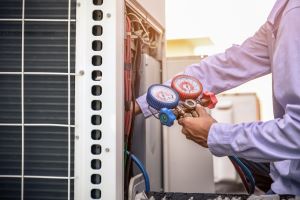Energy-Efficient Heating And Cooling Systems to Save Money On Utility Expenses
As power costs continue to rise, the significance of energy-efficient heating and cooling systems becomes increasingly noticeable. These systems not just assure significant cost savings on energy expenses however also contribute to a much more sustainable future by reducing power consumption. With various choices readily available, consisting of geothermal warm pumps and ductless mini-splits, homeowner face a multitude of selections that can boost convenience and air top quality. Recognizing the key features and maintenance needs is necessary to taking full advantage of these benefits. What factors should be focused on when choosing the ideal system for your needs?
Benefits of Energy-Efficient HVAC Solutions
Energy-efficient A/c systems supply numerous advantages that prolong past simple price savings. By consuming less energy, these systems contribute to decrease greenhouse gas discharges, assisting to battle environment change and promote sustainability.
Additionally, energy-efficient a/c systems typically give boosted convenience levels. A lot of these systems feature advanced technology that enables for better temperature level control and improved air quality (DMAKS HVAC). This leads to a healthier interior setting, which is specifically vital for people with allergic reactions or respiratory system concerns
In addition, purchasing energy-efficient a/c systems can boost residential or commercial property value. As more customers focus on energy efficiency, homes and structures outfitted with these systems might draw in greater quotes in the realty market.
Kinds Of Energy-Efficient Cooling And Heating Options
Just how can house owners and services choose the most ideal energy-efficient cooling and heating alternatives for their requirements? The market supplies a variety of energy-efficient heating and cooling systems, each created to improve convenience while minimizing power usage.
One option is the variable cooling agent flow (VRF) system, which efficiently regulates the temperature in numerous areas within a building. This system adjusts its refrigerant circulation to match the preferred temperature, bring about considerable power cost savings.
Another preferred option is geothermal warm pumps, which use the earth's steady temperature to warm and great areas. By transferring warmth to and from the ground, these systems show outstanding performance, especially in moderate environments.
Additionally, ductless mini-split systems give an energy-efficient choice for homes doing not have ductwork. These systems permit zone-specific heating & cooling, lowering power waste in vacant locations.
Lastly, high-efficiency heating systems and ac system, with innovative SEER and AFUE ratings, provide reliable climate control while consuming much less energy than conventional versions. By evaluating these choices, house owners and businesses can select a cooling and heating system customized to their particular requirements and power performance objectives.
Key Features to Think About

Following, investigate the kind of compressor utilized in the system. DMAKS HVAC. Variable-speed compressors can change their result to match the heating or cooling down demand, bring about improved convenience and power financial savings contrasted to single-speed versions. In addition, look for systems furnished with smart thermostats that provide programmable setups and remote gain access to, allowing for much better control over energy usage
One more critical function is the system's air purification capability. High-efficiency filters can improve indoor air quality and lower energy usage by ensuring the system runs efficiently. Moreover, take into consideration the sort of refrigerant made use of; modern-day systems typically utilize green refrigerants that have a reduced environmental influence.
Last but not least, make sure that the system is suitable with zoning modern technology, which enables personalized temperature control in various areas of your home, improving convenience while lessening power use.
Tips for Selecting the Right System


Next, think about power performance rankings, specifically the Seasonal Energy Effectiveness Ratio (SEER) for cooling systems and the Yearly Gas Utilization Effectiveness (AFUE) for heater. Higher scores show better efficiency, which can lead to considerable savings on energy expenses in time.
Additionally, examine the type of heating and cooling system that best fits your way of living and budget plan. Options include central air, ductless mini-splits, and heatpump, each with its own set of advantages and disadvantages.
Do not neglect the value of proper installment and sizing; an improperly sized system can lead to inadequacies and increased wear. Last but not least, seek advice from with an expert heating and cooling service provider to obtain skilled referrals tailored to your home's special requirements. This thorough method will certainly ensure that you choose an energy-efficient HVAC system that satisfies your demands and budget successfully.
Upkeep for Optimal Effectiveness
As soon as the right heating and cooling system remains in location, ongoing maintenance ends up being vital to ensuring optimal efficiency and durability. A well-maintained system operates better, causing reduced power intake and minimized utility costs. Routine examinations and tune-ups ought to be scheduled at the very least twice a year-- when before the air conditioning period and once before the heating season.

Homeowners need to also be alert concerning monitoring their HVAC system's performance. Uncommon sounds, changing temperatures, or boosted power bills can show underlying issues that require instant focus. By dealing with these problems quickly, house owners can avoid expensive repairs and extend the life expectancy of their systems.
Investing in a maintenance plan with my blog a certified specialist not only improves performance yet also offers assurance, knowing that the system is operating at its best. DMAKS HVAC. Normal upkeep is therefore vital for maintaining power performance and reducing general operational expenses
Verdict
To conclude, you could try this out energy-efficient heating and cooling systems offer a viable service for decreasing utility expenses while improving convenience and air quality. By integrating sophisticated innovations and choices such as geothermal heatpump and ductless mini-splits, homeowner can accomplish considerable energy cost savings and add to environmental sustainability. Careful consideration of system features and ongoing upkeep better makes sure optimum efficiency, making energy-efficient systems a sensible investment for both economic and ecological benefits.
Comments on “Cost-Effective Maintenance Plans with DMAKS HVAC for Your HVAC System.”